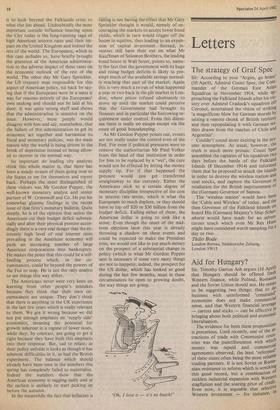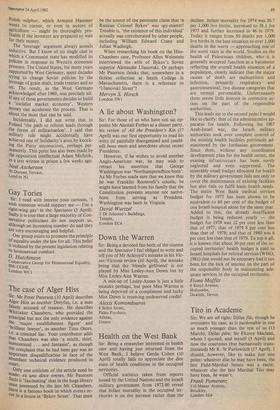Aid for Hungary?
Sir: Timothy Garton Ash argues (10 APril) that Hungary should be offered fresh Western finance, while Poland, Romania and the Soviet Union should not. He seems to be suggesting two things: that to do, business with unreformed 'command economies does not make commercial sense, and that Western financial leverage — carrots and sticks — can be effective in bringing about both political and economic liberalisation.
The evidence for both these propositions is precarious. Until recently, one of the at- tractions of trade with Communist coun- tries was the punctiliousness with which money was repaid and commercial agreements observed, the least 'reformed of these states often being the most reliable trading partners. It is not Soviet or Roma- nian resistance to reform which is wrecking, this good record, but a combination 01 reckless industrial expansion with Western stagflation and the soaring price of credit. Even now, it is arguable that selective Western investment — for instance, in
Polish sulphur, which Armand Hammer wants to corner, or even in sectors of agriculture — might be thoroughly pro- fitable if the investors are prepared to wait for their money. The 'leverage' argument always sounds seductive. But I know of no single case in which a Communist state has modified its Policies in response to Western economic pressure. The United States, for many years supported by West Germany, spent decades trying to change Soviet policies by the leverage of grain deals, trade treaties and so on. The result, as the West Germans acknowledged after 1969, was precisely nil. If any of these governments decides to build a 'socialist market economy', Western money can accelerate the process. That is about the most that can be said.
Incidentally, I did not write that in Poland 'the path to reform leads through the forest of militarisation'. I said that military rule might accidentally have achieved one of Solidarity's aims by knock- ing the Party unconscious, perhaps per- manently. This point has also been made by the opposition intellectual Adam Michnik, In a text written in prison a few weeks, ago.
Neal Ascherson 30 Duncan Terrace, London Ni







































 Previous page
Previous page